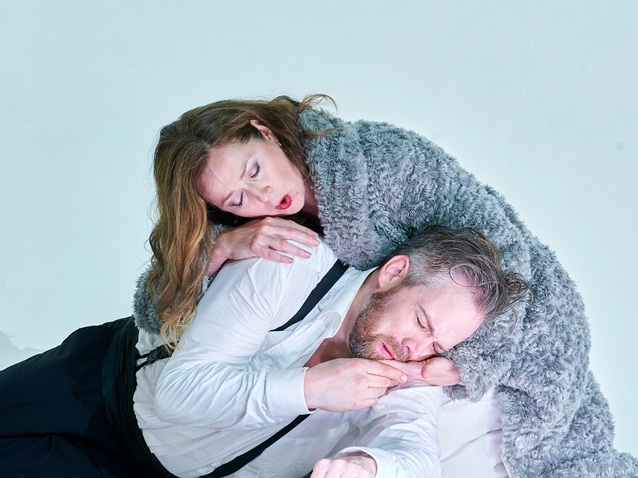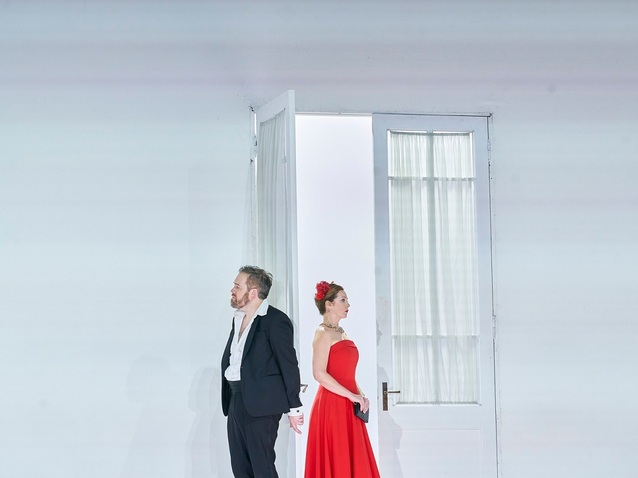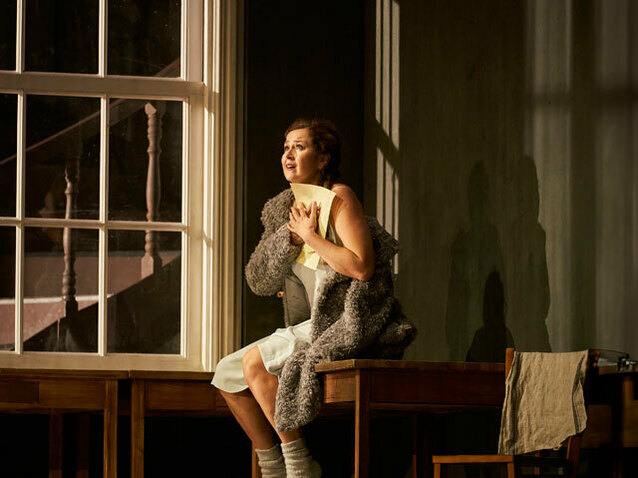 © Gran Teatre del Liceu
© Gran Teatre del Liceu
Gran Teatre del Liceu has inaugurated the new season by putting Tchaikovsky's Eugene Onegin on stage in a new co-production between the Barcelona theatre, Den Norske Opera in Oslo, which premiered the production in 2020, and Teatro Real of Madrid that will present it next season.
This new approach to this surprising intimate wonder – Tchaikovsky called it "lyrical scenes" rather than opera – based on the novel of the same name in verse by Aleksandr Pushkin, was signed in the stage direction by Christof Loy.
The German stage director already made a first foray into Onegin at La Monnaie in Brussels more than twenty years ago, when he set this 19th century play in Stalinist Russia. Now he returns to it focusing on the characters and not the context and in this sense he gets it right because Eugene Onegin is a play about destroyed illusions, about characters in conflict, where context hardly matters.
The problem with Loy's production is that he wants to take the work far beyond where Pushkin wanted it to go and, undoubtedly, far beyond where Tchaikovsky wanted it to go. He has the right to do this, he is also a creative artist and is authorised to do so, but the weight of the music and, above all, the weight of the text, become a burden and it is difficult to carry forward this new look without betraying one or the other.

Eugene Onegin, Gran Teatre del Liceu 2023
Loy turns his proposal around the idea of Eugene Onegin as a play about loneliness and solitude. He distinguishes between "Solitude", Tatiana's unwanted but bitterly accepted solitude when, in the first part, she discovers that she will have to live without love, and "Loneliness", unwanted, destructive loneliness without solution or hope that Onegin will feel in the end. The turning point from solitude to loneliness is the scene of the duel between Onegin and Lenski and the transition from one to the other becomes evident scenically. In the first part there is a clear realistic will in the presentation of the situations and characters, while in the second part the stage is transformed into a white, oppressive, uncomfortable room -Onegin's troubled mind?- everything becomes much more abstract and the scene begins to populate with the "ghosts" of the protagonist.
Obviously, Loy's proposal is a "rereading" proposal suitable only for those who already know the work well through a traditional production. Otherwise not only would the audience not understand anything, but they would not be able to correctly assess Loy's rereading or the highly significant contributions he makes, especially in the second, dreamlike part. For example, making Lenski commit suicide instead of dying from Onegin's shot and shortly afterwards – to everyone's great surprise – resurrecting, or the famous polka which turns into a scene of sexual debauchery, among others.
The direction of the actors is meticulous, it presents us with a very intense and expressive gesture and, aside from a sickly tendency to get the characters to sing on top of furniture (Tatiana finishes her famous letter standing on top of a table), it is theatrically significant. To emphasize the oppressive atmosphere in which all the action takes place, Loy only uses the front of the stage, everything happens there, in those few meters. This is very awkward and ugly for the choral scenes where it looks like the choir is singing in rush hour public transport. Not everything is good in Loy's proposal, but it is intense, well-founded and there is risk taking and a desire for transcendence.

Eugene Onegin, Gran Teatre del Liceu (2023)
Musically, Eugene Onegin on the day of the premiere went well, but it was not without problems. Neither the orchestra nor the choir seemed, at first, to have recovered form the summer holidays, the orchestral sound was not pretty and the choral singing irregular. The quartet between the four women at the beginning of the performance was on the verge of shipwreck. Josep Pons, the principal conductor of the theatre kept order, and little by little the orchestra played with the almost chamberlike delicacy with which Tchaikovsky orchestrated his intimate "lyrical scenes" and in the end it sounded quite good.
Among the vocal soloists the men stood out. Baritone Audun Iversen, who already participated in the premiere of the production in Oslo, did a very good Onegin, singing with ease both in the register and in the vocal projection and from a beautiful vocal colour.
Alexey Neklyudov was also good in Lenski, his “Kuda, kuda”, perhaps the most famous and beautiful tenor aria in all of Russian opera, deservedly getting long applause. Sam Carl played the character of Zaretsky and that of Prince Gremin, a character, the latter, dramatically secondary but enjoying a real musical gift from Tchaikovsky, the beautiful aria "Lyubvi vsye vozrasti Pokorni". Carl did not waste the opportunity, he sang it very well and ended it with some very solid and well-projected low notes that earned him great applause.
Tatiana, the true protagonist of the play, is a very complex character, more than a great singer it requires a great actress who believably presents the psychological evolution of the character from the excited, inexperienced and passionate young woman at the beginning to the poised, rational and intimately bitter woman at the end. Svetlana Aksenova, who also participated in the premiere of the production in Oslo, did a very good job on stage of the psychological evolution of the character, vocally perhaps a little more vehemence and voluptuousness would have been needed in the letter scene.
Olga, Tatiana's capricious and superficial sister was well solved by Victoria Karkacheva, the veteran Liliana Nikiteanu was able to cope without vocal problems with the character of Larina and the too veteran Elena Zilio could barely cope with the role of Filipievna which, despite being anecdotal, has quite a lot to sing. It is worth highlighting the magnificent vocal interpretation that Basque tenor Mikeldi Atxalandabaso made of the strange character of Monsieur Triquet.
Xavier Pujol
Barcelona, 27th September 2023
Eugene Onegin by Piotr Ilitx Txaikovski | Gran Teatre del Liceu | 27 September – 8 October 2023
Liliana Nikiteanu, mezzosoprano. Svetlana Aksenova, soprano. Victoria Karkacheva, mezzosoprano. Elena Zilio, mezzosoprano. Audun Iversen, baritone. Alexey Neklyudov, tenor. Sam Carl, bass. Josep Ramón Olivé, baritone. Mikeldi Atxalandabaso, tenor. Orchestra and Choir of Gran Teatre del Liceu. Josep Pons, conductor. Christof Loy, stage direction. Victoria Bomann-Larsen, restaging. Raimund Orfeo Voigt, scenography. Herbert Murauer, costumes.Olaf Winter, lighting.Andreas Heise, choreography. Production Den Norske Opera (Oslo), Teatro Real (Madrid) and Gran Teatre del Liceu. Gran Teatre del Liceu.
the 30 of September, 2023 | Print
Comments